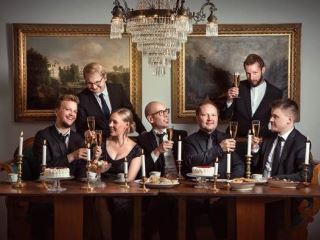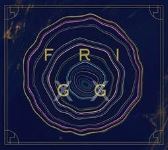
Frigg are: Alina Järvelä (fiddle), Tommi Asplund (fiddle), Tero Hyväluoma (fiddle), Esko Järvelä (fiddle), Petri Prauda (cittern, mandolin), Anssi Salminen (guitar), Juho Kivivuori (double bass)
www.frigg.fi
Hailing from the vast plains of Kaustinen, Central Ostrobothnia, Frigg has been in the vanguard of contemporary Finnish folk music for two decades. The seven-piece “nordgrass” outfit has had its share of extraordinary American tours, but being an ensemble of busy professional musicians with their own careers, it’s a small miracle that the band has remained functional to this day. Now Frigg is on their way to explore a whole new territory of live venues – their home country.

Imagine a band that makes a long-standing career abroad, playing numerous American tours, taking over Japan and ending up in places like Malaysia and Azerbaijan. But on its home turf the band is virtually unknown – and the few people who happen to know them keep marveling how on earth is it possible, that a band this good doesn’t get the recognition it deserves.
Albeit some exaggeration, this kind of scenario is not that uncommon for bands like Frigg. “Our aim has always been abroad. Touring in Finland has actually been a new thing for us”, fiddler and founding member Esko Järvelä explains.
Many Finnish folk music acts still remain explicitly for the export. Even if the band is top notch in its specific niche and the music itself is not “difficult” or too “artsy” for the audiences, the domestic music market just happens to be a bit too narrow and small for various reasons.
So the bows have to be aimed overseas. Originated in the folk music capital of Finland, Kaustinen, Frigg is perhaps one of the best known Finnish folk acts in the world. This wouldn’t have been possible without eight studio records and years of relentless touring.
Nordgrass for life
For their eponymous debut album in 2002 the band coined together its trademark sound, where fierce fiddles are backed by a robust mandolin-guitar-double bass section. This assembly has stuck with the band up to this day and the trademark sound can be easily recognized on their eighth and latest studio album Frixx, which entered the World Music Chart Europe at number five in April. The folk music media labeled their sound as “nordgrass”.
“The instrumentation has been pretty much the same during the years”, says Alina Järvelä, also a fiddler and a founding member. “But we’ve become a bit more professional”, she adds with a laugh.
“When first I joined the band we basically arranged the songs in the studio just moments before recording”, recalls Tero Hyväluoma, who was added to Frigg as yet another fiddler in the late 2000s. “With Frixx we started working on the material six months in advance. That’s something exceptional”, Esko Järvelä notes.

Frigg’s style can be partly traced to another export-friendly fiddle ensemble from Kaustinen, a bit older group named JPP. Frigg’s influences are however more diverse: their sound covers everything from Celtic reels to Appalachian bluegrass-crosspicking to Swedish polskas. “And of course Väsen was a huge influence for us”, Esko says, referring to the Swedish power trio, a giant of modern Scandinavian folk music.
But in the beginning Frigg was also a pan-Scandinavian supergroup. It didn’t get its name from the Norse goddess by accident, since the band had initially two Norwegian fiddlers, the brothers Gjermund and Ole Einar Larsen. “It must have been in the mid-nineties at Kaustinen folk festival where we met them for the first time. Our dads knew each other”, Esko remembers.
Inclusion of the Larsen brothers made Frigg initially sort of like a cultural exchange project between two widely known Scandinavian folk music families, as well as traditions from Finland and Norway. In Finland, one could even portrait the Järvelä family as a local equivalent to the Seegers, the legendary American folk music family: it’s simply quite impossible to imagine the Finnish folk music scene without the impact of the Järvelä dynasty.

Go west, go home
With this unbeatable pan-Scandinavian recipe the band ended up doing countless international tours. They have a special reputation in the United States. “When we played our first tour in the States in 2004, we came to realize that the country has a huge fan base for Nordic folk music”, Esko Järvelä says. “A few years ago we were playing at the Lotus Festival in Indiana, and we saw people on the streets wearing t-shirts saying ‘Väsen & Frigg 4ever’. That was crazy!”
Ultimately it’s not a big surprise that Scandinavian traditional music is so popular in America though. Especially Midwestern states such as Minnesota and Michigan had an influx of Scandinavian settlers in the beginning of the 20th century. The strong cultural and musical tradition of their offsprings manifests itself through various festivals all around the area. “But we’ve toured a handful of all kinds of events from Nordic music to bluegrass and world music festivals. We’ve even played at a blues festival”, Alina remarks. Frigg was also selected to this year's Showcase Scotland festival, where they played to a full house with an ecstatic audience of several thousand fans.
The American festival culture differs a lot from Finland, Tero Hyväluoma says. “I can’t come up with any Finnish equivalents to these kinds of festivals… I mean, they are events where people come to dance and party with instrumental music. People tend to dance in concert hall shows as well."

“Of course Kaustinen Folk Music festival is an anomaly in Finland, but even that event’s spirit differs a bit from those [American] festivals as well”, Alina reflects. Nevertheless, Frigg has now also decided to take over Finnish venues as well. “Our new booking agent was really baffled about the fact that we had so little experience of playing in Finland”, Esko laughs.
In 2018 Frigg expanded their spectrum by making a Christmas album with two guest vocalists: jazz crooner Johanna Försti and Timo Rautiainen, a domestic-market heavy metal frontman who fell in love with folk music. Frigg also did some shows with different Finnish philharmonic orchestras. The band members however quickly discard the idea that in order to get shows in Finland a band has to invent different concepts. “I don’t think the concept itself is a means to an end. For instance, that Christmas project is now over. We played a couple of tours, but we are not planning to repeat it every Christmas”, Hyväluoma answers.
A band with three different WhatsApp groups
At the end of the day, Frigg has managed to sail through their two-decade existence quite well. “For instance, the folk music audience still buys cd’s – especially in Germany, the UK and the US”, Hyväluoma says. “It actually is a real source of income for us”, Esko Järvelä adds.“The Christmas album left us with a hunger to come up with new interesting projects”, Hyväluoma continues.
Frigg now has shows booked up until late 2021 – next year they’re going back to Japan, for instance. Obviously some tours and shows in the spring and summer 2020 have been cancelled because of the coronavirus pandemic, but hopefully the situation changes soon and they will be able to get back on the road.
It turns out that one real challenge has been managing the personnel of the band. Getting seven extremely busy professional folk musicians together has been an absurd task. “When we were young, we would hang out together for a whole summer just rehearsing, drinking beer and playing croquet in the park. Now we have three different WhatsApp-groups and still managing the band feels almost impossible”, Alina Järvelä laughs.
“We’ve gone through line-up changes and moments where the future has felt unclear. But somehow we’ve managed to keep the wheels rolling! And that’s great”, Esko sums.
Frigg: Twenty years of fierce fiddling. Published 1.4.2020.
The FMQ (Finnish Music Quarterly, www.fmq.fi/archives) has been a showcase in English for Finnish musical culture since 1985. It publishes new items on its website every week and a printed edition at the end of the year. The FMQ is published by Music Finland. Its partners are the Sibelius Academy, the Society of Finnish Composers and the Finnish Musicians’ Union. The magazine also receives a grant from the Finnish Ministry of Education and Culture.
Photo Credits:
(1)-(2) Frigg 2020,,
(3) folkBALTICA,
(5) Finnish Music Quarterly
(unknown/website);
(4) Tønder Festival
(by Walkin' Tom).